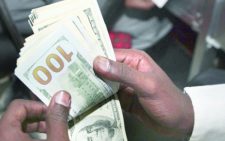Traders decry weak Kenya Shilling against US Dollar

A section of general accessories importers from Kiambu have made a distress call to the government after their businesses face near collapse due to the skyrocketing of the dollar against the Kenya Shilling.
The importers, who mainly deal with motorbike spare parts and other accessories, want to government to move in fast and regulate the fluctuation of the Kenya shillings.
They have also urged CBK to intervene in an attempt to hold the exchange rate at a level favourable to the small scale importers.
They told People Daily in Limuru yesterday that they are counting losses after importing goods only for the shilling to loss value compared to the dollar.
Chege Muthee and Muniu Gachohi who spoke on behalf of the importers claimed that there’s a cartel of wealthy people which buyers dollars in bulk from the Central Bank of Kenya at the expense of the small scale traders.
“They normally buy dollars in bulk and keep them only to seller the same when the shilling depreciates and we find this unfair to us because we are upcoming traders who needs government protection as we engage in our hustles,” said Muthee.
There has been an increasing debate regarding the exchange rate and the
performance of the Kenya Shilling with discussions on this topic having centred on the recent weakening of the Kenya Shilling suggesting that this is a bad out come of the economy.
The Central Bank of Kenya has since sought to clarify that foreign exchange ups and downs are obvious the world over and hence the Shillings should not always strengthen.
A competitive exchange rate ensures that the interests of both exporters and importers are balanced.
“In this regard movements in the exchange rates serve to correct any
imbalances in the market.The movement of the exchange rate can not therefore be classified as good or bad if it is adjusting to economic factors”, said a statement from CBK.
CBK said that it should dawn in all that that the exchange rate adjusts as in it weakens or strengthens in line with
economic factors including trade, production and investment in the economy.
The CBK therefore provides the policy environment and does not target a
particular level or direction of change of the exchange rate.
It participates in the foreign exchange market as and when it is necessary to stem excessive volatility emanating from external shocks, or to cover a short-term shortage of foreign exchange liquidity in the market ,or to effect Government external payments obligations.











